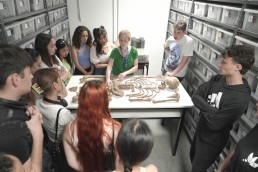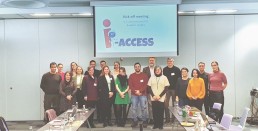Advancing children’s rights
1. Italy | MUSA: Where Global Citizenship Meets Science and Human Rights | Terre des Hommes Italy

MUSA museum project. ©Tdh
There has been an alarming increase of serious problems among children linked to fragile peer relations, characterised by an increasingly widespread culture of hostility, fear of diversity which results in violence. The dynamics of exclusion and discrimination within multi-ethnic classes often lead to the formation of culturally divisive groups, where children with a migration background are particularly exposed to violence.
In response to these needs, Terre des Hommes Italy conceived the MUSA educational project, closely linked to the museum of the same name inaugurated in 2021 in Milan. The MUSA project represents an innovative and concrete response to the emerging educational and social needs in Italy by providing a scientific avenue to understand the evolution of phenomena such as racism, discrimination, violence and human rights violations.
It showcases who the vulnerable were in history (especially women and children), the conditions they lived in, and why it is crucial to understand the reasons behind certain social and cultural dynamics that can threaten the foundational values of Global Citizenship even today. Through an immersive journey across different historical periods, the historical-archaeological, criminalistic, and humanitarian areas of MUSA give space and voice to the vulnerable, reconstructing their existence through traces on bodies and acknowledging the dignity they were deprived of due to violence, discrimination, and poverty.
After participating in the training course, Federica, a student from Agnesi High School in Merate, said to the MUSA operators with a particular light in her eyes:
I wanted to thank you for the project, especially for the visit to MUSA, which was beautiful! Now I know what I want to study at university: I want to become a forensic doctor!
MUSA also works on the cognitive and emotional sphere of students to help them acquire a broad and critical view of the socio-cultural dynamics that led to human rights violations. It demonstrates that the most evolutionarily strong communities are more open, multicultural, inclusive, and capable of respecting diversity and protecting the rights of their members. In 2023, the MUSA project engaged with 651 students and 51 teachers.
Created by the Laboratory of Anthropology and Forensic Odontology at the University of Milan, in collaboration with Terre des Hommes, Fondazione Cariplo, and Fondazione Isacchi Samaja, MUSA is the first University Museum of Forensic Anthropological Sciences for Human Rights in Europe. Its goal is to highlight the role of science in protecting Human Rights and promoting the values of Global Citizenship.
Check out this animated video that explains this project further (in Italian).
2. Bulgaria, Romania, Greece | i-ACCESS MyRights | Terre des Hommes Lausanne

i-Access kick off meeting. ©Tdh
In several European countries such as Bulgaria, Romania and Greece, children and young people face major challenges in accessing justice and seeking redress when they become victims of crime, especially children and youth from marginalised groups.
Children are not informed where to refer to when they have a problem, whom to talk to, who will believe them. An offence was committed against me and I didn’t know who to see, what to do, or who I needed to talk to,
In many cases, when a child is a victim of a crime, they suffer an additional layer of trauma: not knowing what to do about it. Children carry the stress and fear of what they experience alone, and being unable to seek justice, cannot resolve these issues or recover.
The i-ACCESS MyRights project addresses the lack of access to simplified information for children on their rights in criminal proceedings in Europe. Using artificial intelligence, Terre des Hommes created a tool that could help children navigate complex criminal proceedings and reduce their stress, regardless of gender, social or cultural background.
I have participated in groups and activities before, but this was the first time that someone asked for my feedback before they created something. Usually, they just present something to us. It made me feel heard.
The solution was designed by working closely with children through co-design sessions in Bulgaria, Romania and Greece to meet their real needs. Our teams were able to identify key rights-related issues among children, culminating in the development of a chatbot that addresses the most significant concerns.
The app was first implemented in 2023 focusing on the design and development of the AI chatbot, including identifying ethical, legal and technological issues around the development of such a tool. In addition, it was necessary to understand and tackle the day to day challenges, familiarise children and the Terre des Hommes team with the topic and ensure cross-sectoral coordination on a consortium level and externally.
In 2024, Terre des Hommes will focus on broader awareness raising, communication, testing and iteration to deploy the chatbot in local contexts.
Read more about the i-ACCESS MyRights project here or watch this video that describes the project.
